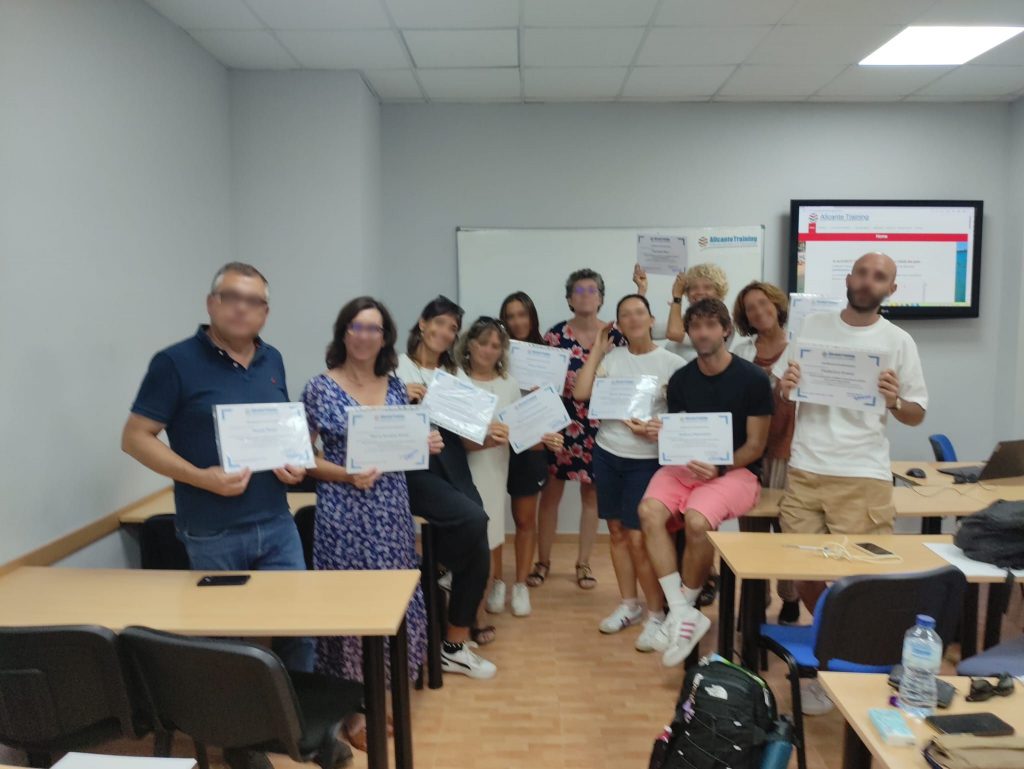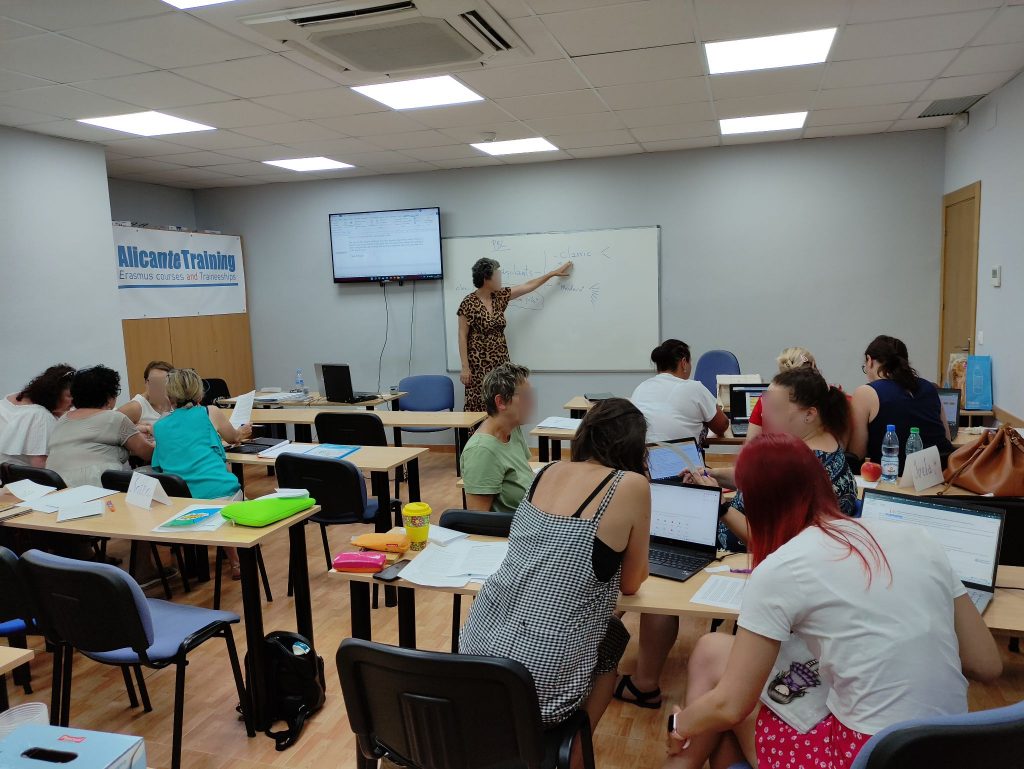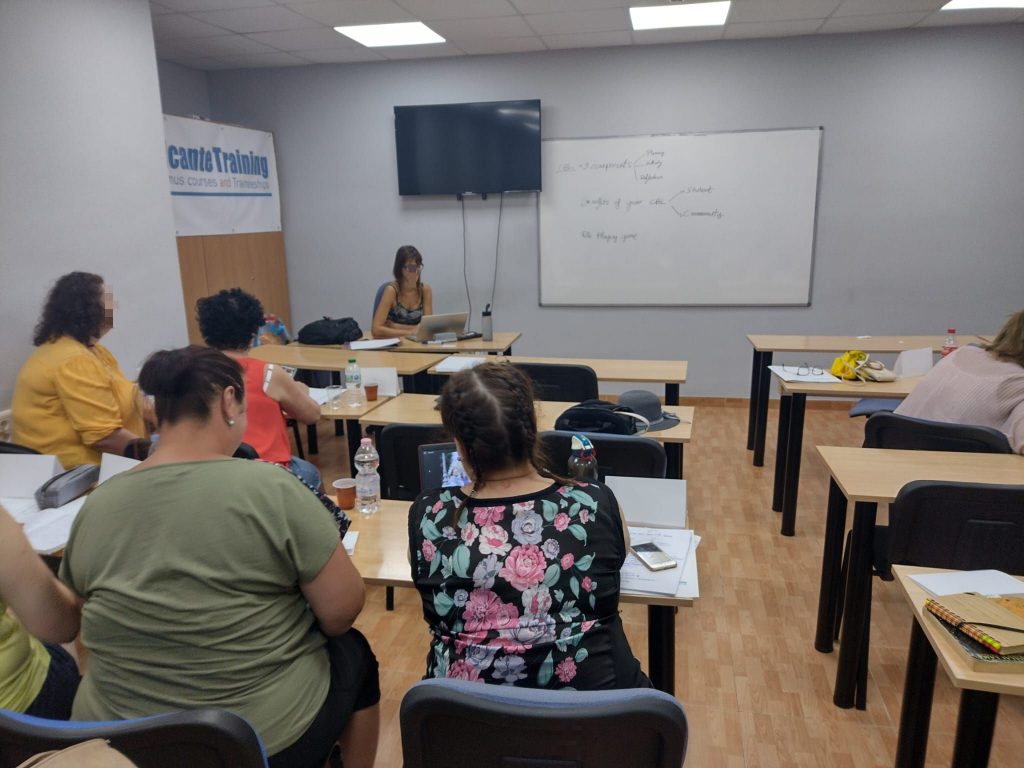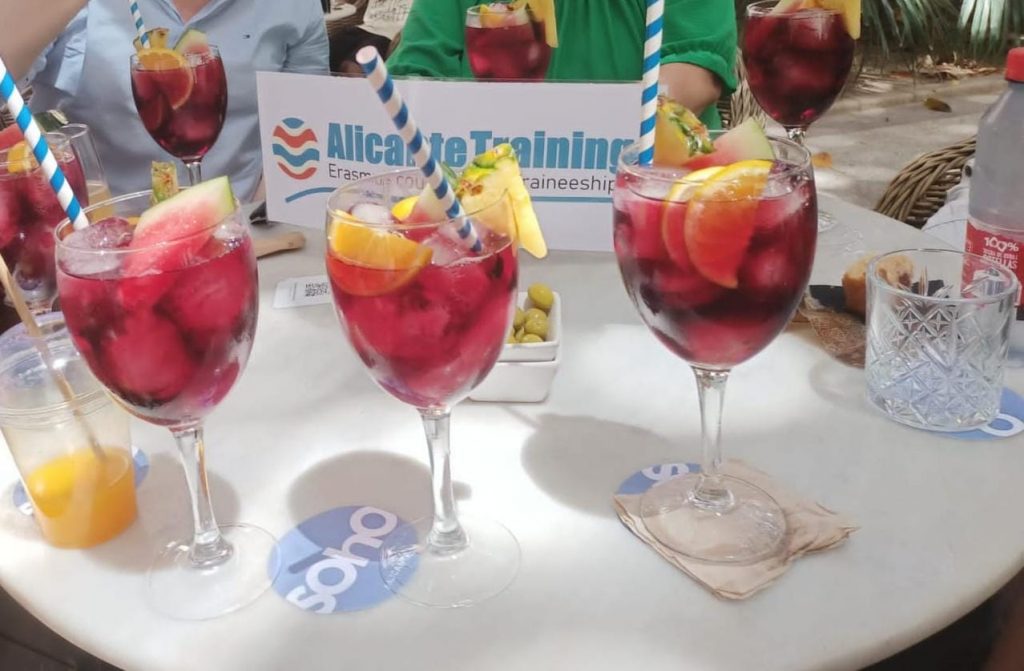

You can also download the course offer and MORE information HERE
JUNE/24
Creation and destruction of ephemeral art as a didactic resource
(Dates: 20/6/2024 to 25/6/2024)
For centuries, Europeans have celebrated the summer solstice with bonfires, symbolizing nature’s peak fertility and harmony. Fire was believed to cleanse and protect, while festivities included dancing, rituals, and blessings. In some European regions, like Alicante, bonfire traditions have evolved into an art form, featuring giant sculptures burnt on June 24th, often with social commentary. We’re taking advantage of this festival to offer this course to raise awareness of this intangible heritage, with workshops making these sculptures on a smaller scale. They can be used as a didactic tool in the classroom… And to have a good time for a few days during the main festivities of the city (hundreds of street parties, the beach, music, fireworks…). And a party atmosphere that will fill the whole of the city.
In this course you will learn and enjoy life at the same time!
- REMARKS (1): Art teachers and bonfire experts will lead all sessions. Some of the sessions will be out of the classroom, with visits to bonfires and other types of special ‘construction’.
- REMARKS (2): You can find more information about the Alicante bonfires in this website: https://alicanteabout.com/festivals/alicante-bonfires-a-guide-to-the-hogueras-de-san-juan-festival
- DISCLAIMER: The website linked above does NOT belong to AlicanteTraining. It has no connection with our company. AlicanteTraining is NOT responsible for the information contained on the website or any changes its authors may make in the future.
For more information and prices, please, see the course guide.
JULY/24
Inclusion and violence prevention: international workshop and shared experiences ((Confirmed))
(Dates: 01/07/2024 to 05/07/2024)
Improving the integration of students with fewer opportunities, either because they are socially disadvantaged or because they are functionally diverse, is one of the main objectives of the Erasmus programme. In many cases, a problem of social inclusion is the seed from which violence can germinate. The problem is not simple. Nor is there a single solution that applies to all cases. In this course, teachers and heads of schools located in singular or disadvantaged neighbourhoods will present the main strategies that they themselves have used in their schools, in schools with pupils of more than 45 nationalities or in institutions located in areas of economic and social deprivation. Above all, the course aims to encourage participants to share their experiences, highlighting the strategies that have worked and those that have not, and trying to analyse the causes and strategies that have led to success or failure in each case. The problem does NOT have a universal solution, so it CANNOT be approached as a recipe from a theoretical course: it must be approached as a problem of strategy, so that each teacher has the tools at their disposal and can apply them to their specific situation.
REMARKS (1): All sessions will be taught by active primary or secondary school teachers with a strong experience in difficult centres.
For more information and prices, please, see the course guide.
Mindfulness pro prevenci stresu a syndromu vyhoření ve výuce / Mindfulness for Stress and Burnout Prevention in Teaching ((Confirmed, last places))
(Special course with Czech / Slovak translation)
(Dates: 08.07.2024 – 14.07.2024)
Tento kurz se zabývá konceptem Mindfulness a poskytuje účastníkům nástroje a techniky pro zvládání stresu a prevenci vyhoření v učitelské profesi. Obsah kurzu zahrnuje úvod do mindfulness, porozumění stresu a syndromu vyhoření, praktická cvičení všímavosti a strategie pro začlenění mindfulness do každodenní učitelské praxe.Aktivity kurzu jsou navrženy tak, aby byly interaktivní a poutavé a umožnily účastníkům praktikovat techniky mindfulness v podpůrném prostředí. Prostřednictvím řízených meditací, skupinových diskusí a reflektivních cvičení účastníci získají hlubší porozumění tomu, jak může mindfulness pozitivně ovlivnit jejich pohodu a efektivitu výuky. Celkově je tento kurz nejen informativní, ale také praktický a nabízí hmatatelné dovednosti, které lze okamžitě uplatnit ve třídě. Zkoumáním souvislostí mezi všímavostí, snižováním stresu a prevencí vyhoření ve výuce získají účastníci cenné poznatky a nástroje pro zlepšení své celkové pohody a profesní praxe.
- POZNÁMKY (1): Všechny hodiny povedou univerzitní profesoři nebo aktivní učitelé základních či středních škol nebo odborní sportovní/interní trenéři.
—————–
This course explores the concept of Mindfulness and provides participants with tools and techniques for managing stress and preventing burnout in the teaching profession. Course content includes an introduction to mindfulness, understanding stress and burnout, practical mindfulness exercises, and strategies for incorporating mindfulness into daily teaching practice. Course activities are designed to be interactive and engaging, allowing participants to practice mindfulness techniques in a supportive environment. Through guided meditations, group discussions and reflective exercises, participants will gain a deeper understanding of how mindfulness can positively impact their well-being and teaching effectiveness. Overall, this course is not only informative but also practical, offering tangible skills that can be immediately applied in the classroom. By exploring the connections between mindfulness, stress reduction, and burnout prevention in teaching, participants will gain valuable insights and tools to improve their overall well-being and professional practice.
- NOTES (1): All classes will be taught by university professors or active elementary or high school teachers or professional athletic/intern coaches.
For more information and prices, please, see the course guide.
Strategies for Managing Stress and Promoting Teacher Well-being
(Dates: 08.07.2024 – 14.07.2024)
The course called “Strategies for Managing Stress and Promoting Teacher Well-being” offers a range of valuable content and engaging activities aimed at helping educators effectively cope with stress and prioritize their well-being. The course delves into various stress management techniques, such as mindfulness practices, time management strategies, and self-care routines, to equip teachers with the necessary tools to navigate the challenges of their profession. Additionally, the course explores the importance of maintaining a healthy work-life balance and provides practical tips on how to prevent burnout and enhance overall well-being. By enrolling in this course, participants will not only gain a deeper understanding of the impact of stress on their mental and physical health but also learn how to implement evidence-based strategies to mitigate its effects. Through interactive activities, case studies, and reflective exercises, teachers will have the opportunity to apply the concepts learned in real-life scenarios, fostering a deeper level of engagement and retention. Ultimately, “Strategies for Managing Stress and Promoting Teacher Well-being” offers a holistic approach to self-care and stress management, empowering educators to thrive in their roles and prioritize their own well-being. REMARKS (1): All sessions will be taught by university professors or by active primary or secondary school teachers or specialized sports/well-being monitors.
For more information and prices, please, see the course guide.
Effective Breathing Techniques, Ergonomic Practices, and Burnout Prevention for Educators
(Dates: 08.07.2024 – 14.07.2024)
The course titled “Effective Breathing Techniques, Ergonomic Practices, and Burnout Prevention for Educators” offers a unique opportunity for educators to enhance their well-being and productivity in the workplace. The course covers a wide range of topics, including techniques to improve breathing patterns, ergonomic practices to prevent physical strain, and strategies to prevent burnout. By focusing on these key areas, educators can learn how to manage stress more effectively, maintain a healthy work-life balance, and ultimately improve their overall quality of life. The course (1) provides valuable information on how to optimize breathing techniques and ergonomic practices and (2) emphasizes the importance of burnout prevention for educators. By understanding the impact of stress and burnout on their mental and physical health, educators can take proactive steps to prevent burnout and maintain a positive mindset. Additionally, the course offers practical activities and resources that educators can incorporate into their daily routines to promote self-care and well-being. Overall, “Effective Breathing Techniques, Ergonomic Practices, and Burnout Prevention for Educators” is a valuable course that equips educators with the knowledge and skills needed to thrive in their profession while prioritizing their health and well-being.
- REMARKS (1): All sessions will be taught by university professors or by active primary or secondary school teachers or specialised sports/wellbeing monitors.
For more information and prices, please, see the course guide.
Utilizing Sports, Dance and Relaxation Activities as Tools for Educators’ Well-being
(Dates: 08.07.2024 – 14.07.2024)
The comprehensive course called “Utilizing Sports, Dance, and Relaxation Activities as Tools for Educators’ Well-being” offers a unique opportunity for educators to enhance their overall well-being through engaging content and activities. The course delves into the importance of incorporating sports, dance, and relaxation techniques into educators’ daily routines to promote physical, mental, and emotional health. By exploring various strategies and practices, educators can learn how to effectively manage stress, improve their mood, and boost their energy levels, ultimately leading to a more balanced and fulfilling lifestyle. Through a combination of short theoretical knowledge and a lot of practical applications, this course equips educators with the necessary tools to prioritize self-care and cultivate a positive work-life balance. Participants will have the chance to explore different types of sports, dance styles, and relaxation exercises that can be easily integrated into their professional and personal lives. By understanding the benefits of these activities and how they contribute to overall well-being, educators can not only enhance their own health and happiness but also create a more positive and supportive learning environment for their students. This course serves as a valuable resource for educators looking to invest in their well-being and develop sustainable habits that will benefit them both inside and outside the classroom. REMARKS (1): All sessions will be taught by university professors or by active primary or secondary school teachers or specialised sports/weebeing monitors
For more information and prices, please, see the course guide.
New approaches to digital education (for secondary education and VET)
(Dates: 08/07/2024 to 12/07/2024)
Digital education is one of the goals that the Erasmus+ Programme pursues in its latest edition. As a response to that, we offer this course to improve the digital teaching skills. This course would like to review the most effective tools, applications and new approaches to be applied with our increasingly technological students. The aim of this course is for teachers with user-level computer skills to acquire the skills to create materials and publish or share them with their students using new technologies. The course is developed in a participative way, being the teachers the ones who must elaborate didactic materials, videos, tests, performances and other materials, which must also be reflected in a diary-blog or web-diary that will be elaborated by the participants throughout the course. The contents of the course include Blogging, Applications for online teaching (Meet / Zoom / Webex /Loom and others); Creation of didactic materials (advanced resources in Power point / Advanced GoogleSlide / Style rules for presentations – not everything goes); Create your own Youtube video channel; ESL videos, Canvas; Applications for student participation (Quizzes, Quizlet, Kahoot), Google Resources for Teaching, AI resources for education, ChatGPT and other free resources.
- REMARKS (1): All sessions will be taught by university professors or by active primary or secondary school teachers with experience in each of the technologies.
- REMARKS (2): It is highly recommended that those attending the course bring their own laptop, so that they can work more comfortably (in their own language) and, in addition, they will be able to take the applications with which we work installed and well configured.
For more information and prices, please, see the course guide.
Outdoor education: a practical course without classroom ((Nearly corfirmed))
(Dates: 08/07/2024 to 12/07/2024)
The city, the countryside, the university campus, the sea, the beach… The students’ environment offers numerous didactic resources that allow teaching in which the students, through their own experience, learn by themselves with a significant learning outcome that will be difficult to forget. The didactic model of the course is based on taking advantage of the city of Alicante, its environment and its services as a huge laboratory where teachers turn into students, and they will be able to check the functionality of the model and will be able to devise their own formulas to adapt this model to their areas of knowledge.
Briefly, the idea is to use the city as an educational tool, exploiting the fact that Alicante is a city with a beach, a port, a European Agency (EUIPO), a very mild climate and surrounded by mountains.
For more information and prices, please, see the course guide.
SDGs in educational centres. Successful experiences and visits to unique facilities (3rd. edition / 24)
(Dates: 15/07/2023 to 19/07/2023)
The 2030 Agenda for Sustainable Development, adopted by all United Nations Member States in 2015, provides a shared blueprint for peace and prosperity for people and the planet, now and into the future. At its heart are the 17 Sustainable Development Goals (SDGs), which are an urgent call for action by all countries – developed and developing – in a global partnership. All members of society -and educational centres in particular- should contribute to the best of their ability to the achievement of these goals. In the course we will also study how SDGs are implemented in educational centres. By communicating successful experiences and organizing visits to unique facilities we intend that, (1) active teachers and managers share with the attendees their experiences in implementing measures to train / raise awareness of the SDGs among pupils. We believe that it is interesting to learn about the experiences that have worked and those that have not been successful, in order to avoid repeating the mistakes. But the course also shows (2) some interesting facilities existing in the province of Alicante, which can serve as a model or inspiration to generate useful ideas for attendees.
For more information and prices, please, see the course guide.
Intensive Spanish language course for education staff
(Dates: 15/07/2024 to 19/07/2024)
In this course we aim to update your knowledge of Spanish, whatever level it may be. The didactic model we propose is refreshing, with many activities in the street and in real situations, such as shopping, eating out, booking a hotel, finding your way, etc. The goal is that the participants acquire sufficient knowledge of Spanish to be able to move around the city and immerse themselves in the Spanish culture, lifestyle and traditions. The course is designed for any level of previous knowledge, with “help” in five different European languages in case you need it.
REMARKS (1): All sessions will be taught by university professors or by active primary or secondary school teachers with experience in each of the technologies.
REMARKS (2): All attendees who follow the course will receive a document accrediting attendance, participation and achievement, certifying 30 hours of dedication.
For more information and prices, please, see the course guide.
Introduction to Artificial Intelligence for teaching staff
(Dates: 29/07/2024 to 02/08/2024)
At Alicante Training, we understand that educators need to stay ahead in the ever-evolving landscape of technology. That’s why we’ve designed a special course on Artificial Intelligence (AI) just for you. Our goal is to help you create engaging materials effortlessly, let AI handle repetitive tasks, and ensure academic integrity in your classroom.
We believe in the power of AI to transform education, and although this course might not be profitable for us because we’re organizing it very late in the season, we are committed to providing it because we see it as a true urgent necessity. We’ve consulted with top experts and crafted a comprehensive syllabus to meet your needs.
- REMARKS (1): All sessions will be taught by university lecturers or by active primary or secondary school teachers with experience in each of the methodologies.
- REMARKS (2): It is highly recommended that those attending the course bring their own laptop / tablet to search better the information and in their own language.
For more information and prices, please, see the course guide.
New ways to teach in STEM and Life Sciences: Successful experiences
(Dates: 29/07/2024 to 02/08/2024)
As no one could understand a hospital using 20th century procedures, education must also adapt to state-of-the-art teaching procedures. The current trend is that students must learn for themselves, in other words, they must learn how to learn. In this course, we will explore 5 great ways to get students to seek information and learn on their own. Participants will try out these five different teaching styles for themselves as if they were learners: (1) problem-based learning, (2) challenge-based learning, (3) flipped classroom, (4) service-based learning and (5) project-based learning…. Depending on the use of time, other learning modalities, perhaps more specific to certain areas of knowledge, may be considered. In addition to teaching the different models, a critical analysis of each model will be made. The experience of the teachers taking part in the course, this time as students, will enable them to analyse for themselves the strengths and weaknesses of each of the procedures.
- REMARKS (1): All sessions will be taught by university lecturers or by active primary or secondary school teachers with experience in each of the methodologies.
- REMARKS (2): It is highly recommended that those attending the course bring their own laptop / tablet to search better the information and in their own language.
For more information and prices, please, see the course guide.
MAY/25
SDGs in educational centres. Successful experiences and visits to unique facilities (1st. edition / 25)
(Dates: 05/05/2024 to 09/05/2024)
The 2030 Agenda for Sustainable Development, adopted by all United Nations Member States in 2015, provides a shared blueprint for peace and prosperity for people and the planet, now and into the future. At its heart are the 17 Sustainable Development Goals (SDGs), which are an urgent call for action by all countries – developed and developing – in a global partnership. All members of society -and educational centres in particular- should contribute to the best of their ability to the achievement of these goals. In the course we will also study how SDGs are implemented in educational centres. By communicating successful experiences and organizing visits to unique facilities we intend that, (1) active teachers and managers share with the attendees their experiences in implementing measures to train / raise awareness of the SDGs among pupils. We believe that it is interesting to learn about the experiences that have worked and those that have not been successful, in order to avoid repeating the mistakes. But the course also shows (2) some interesting facilities existing in the province of Alicante, which can serve as a model or inspiration to generate useful ideas for attendees.
- REMARKS (2): All attendees who follow the course will receive a document accrediting attendance, participation, and achievement, certifying 30 hours of dedication.
- REMARKS (1): All sessions will be taught by university professors or by active primary or secondary school teachers with experience in each of the technologies.
For more information and prices, please, see the course guide.
More information
Course fees:
- The prices, description, learning objectives, Methodology & assessment, certification details and more additional information are detailed on the course-programme.
- All the registered participants can ask for collaboration to find a flat / hostelling according to their preferences.
- All the participants will have a “emergencies telephone number” 24/7 to assist /help the participant if they have a problem in Alicante.
Special conditions:
- If you arrange a group of 7 or more people, we can offer the course you want in the dates you prefer.
- If you arrange a group of 10 or more people, we can offer the course you want in the language and dates you prefer.
Our courses respond to the needs of teachers around Europe. Our offer of courses changes every year depending on the needs that we detect and the suggestions that we receive from our partner centres and colleagues.

We are preparing our course offer for 2024-25. In which, as always, there will be courses on information technologies, teaching innovation and, of course, NON-formal activities, but which are essential in teacher training (soft skills, NON-verbal communication techniques, etc.).

In all our courses, the teaching staff are university, primary or secondary school teachers, with specific training in the subject they deal with. We try to have a different teacher every day, because this way you can see more points of view: not all teachers have the same teaching style.
During course hours, we work…. But the day is long and there is time to go to the beach, make friends and more….




